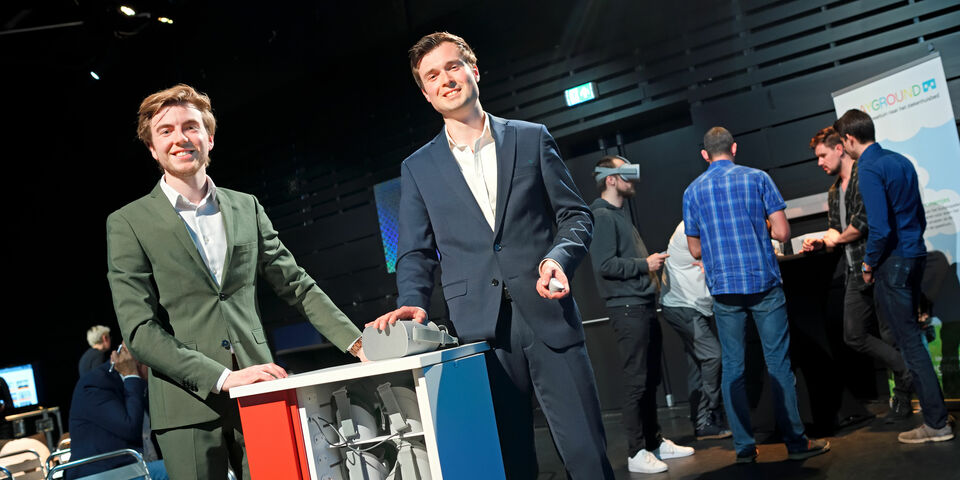DTW | Virtual Reality glasses reduce the pain that doctors sometimes aggravate
Less pain, less fear, and more understanding in a hospital situation: these are the advantages of using virtual reality glasses in the healthcare sector. Within a few years, patients will be wearing VR glasses several times during a hospital treatment, Freek Teunen and Jason van Eunen expect. They founded MedKitVR and organized an afternoon as part of the Dutch Technology Week during which they talked about the significance of VR in healthcare.
The VR glasses are viewed from every angle in de Kleine Zaal of the Effenaar Monday afternoon. Not just literally - the public is allowed to use several demo glasses - but figuratively as well. People are talking about the significance of VR for doctors and healthcare providers and what it can do for patients, both old and young, as well as about the current state of affairs and what the future may bring.
Guido Helmerhorst talks about the trainings his software company Warp develops. Everything they produce is based on realistic 360 degrees videos and interaction. “We are able to let a few individuals, or a thousand people at once, use VR glasses to train a resuscitation procedure, to teach them how to break bad news to patients, or how to evacuate a hospital.” Health scientist Rik de Vries tells how he managed to allay the fear of a hospital visit (from which one-third of people suffer) using a virtual tour of hospitals. “A spatial orientation adds to a lowering of fear. It’s easier for doctors when a patient is calmer and has a lower blood pressure.”
Pain free
One of the speakers works in a hospital. Emergency care doctor Michiel Tebbes starts by showing his treatment room in Teaching Hospital Deventer. No persons, only blood spatters everywhere. That makes an impression. But he also says: “In emergency care, seventy to ninety percent of patients are in pain. We often aggravate that pain; by resetting broken bones, or pricking with a needle. We do something to relieve that pain in just nineteen percent of all cases. How? By injecting morphine. Not a small dose, but a lot. And that leads to side effects.
The emergency care doctor was up for research into the use of VR glasses because experience has taught him that it helps when a young patient plays a game on his smartphone during treatment. The advantages became clear after only three weeks of testing in Deventer; less pain, less fear, and more distraction.
Visitor Jor Franke recognizes much in what Tebbes says. He is a male nurse at center for mental healthcare Grote Beek and has experience with the use of VR with elderly patients who suffer from neurocognitive disorders. “Two claustrophobic clients absolutely refused to try it, two manic clients thought is was wonderful when they got to take a virtual roller coaster ride. I noticed that my depressed clients really found peace and tranquility in a virtual environment, such as a remote beach.”
Franke also saw the disadvantages the emergency care doctor touched upon earlier. “The technology sometimes leaves something to be desired, the smartphone overheats, you get disconnected, it takes time - that you don’t have - to explain.” Still, Franke is enthusiastic and regrets the fact that his mainly older colleagues suffer from technophobia.
MedKitVR
Jason van Eunen, master’s student of Innovation Management, and Freek Teunen (former TU/e student) hope to do something about this. Today, they present their physical MedKitVR to an audience for the first time. It is a cabinet on wheels with six pairs of VR glasses, chargers, batteries, information, and cleaning agents. “It can be used in different situations, and we want to test it in several hospitals.”
They founded the company MedKitVR in 2018. It is a follow-up to their startup from 2017, PlaygroundVR, which allows children who are confined to a hospital bed to experience the sensation of playing outside and making friends. Van Eunen and Teunen organized this DTW events because they wanted to “share the available knowledge on VR in healthcare with each other.” Teunen continues: “We want to discover the unexplored opportunities and not let them go to waste.”




Discussion